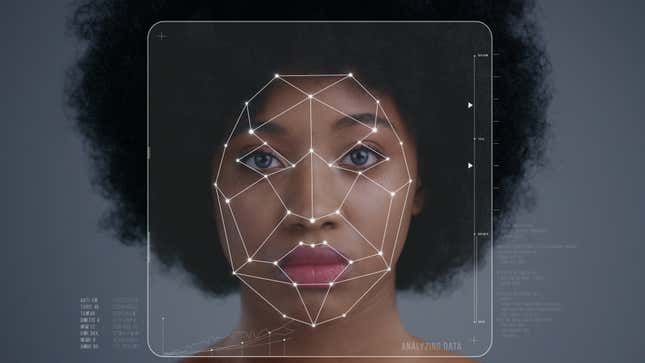
The long, arduous slog that’s been 2020 has had me reflecting on many things. One of those things has been how extensively movies and shows about cops lie to us. We’re repeatedly inundated with this idea that cops are moral arbiters who, operate like a well-oiled machine, and utilize the most cutting edge technology to uphold justice. In reality, cops are just as stupid as the rest of us, only far more dangerous because they’ve inexplicably been given weapons of war and questionable training. “Cutting edge” technology is often synonymous with glitches and a spotty success rate in the real world. When used by law enforcement, those glitches can potentially have dangerous and life-altering effects, as two men in Detroit have learned.
The Detroit Free Press reports that last year Michael Oliver, a 25-year-old Detroit man, was mistakenly accused of a felony after facial recognition technology misidentified him. Oliver was wrongly accused of reaching into a teacher’s vehicle, snatching his phone and throwing it. After the tech reviewed footage of the incident it labeled Oliver an investigative lead and, after the victim identified Oliver as the suspect from a lineup, he was charged with a count of felony larceny for the May 2019 incident.
Now, while the technology got the wrong guy, it also points out the shoddy detective work by the Detroit Police Department. The incident started after the teacher saw two students fighting and pulled out his phone to record it after calling 911. I want to emphasize the point that they were students.
Michael Oliver is a 25-year-old man.
The assailant seen in the video is darker skinned and has no tattoos. Oliver is lighter skinned, has tattoos all over his arms and to be frank, looks like a completely different person. Additionally, a second man in the video who appeared to be a friend of the assailant was identified. The detective was given the man’s name but just decided not to interview him. After noticing that the man seen on the video and his client looked nothing alike, Oliver’s attorney, Patrick Nyenhuis, took the evidence to Wayne County Assistant Prosecutor Brian Surma and the teacher. They realized they had the wrong man and the charges were immediately dropped.
The facial recognition technology employed by the Detroit Police Department has been in use since 2017. It has come under controversy because of misidentifying Black people, and that controversy has only intensified in the wake of George Floyd’s death in May. While new policies have mandated that the technology only be used to help solve violent felonies, protesters have demanded the technology stop being used outright.
Which, honestly, makes so much sense, I don’t understand why it’s a thing that needs to be demanded. If you can’t trust the technology to correctly identify someone in the case of a destroyed cell phone, should it really be used in cases where a wrongful accusation can result in a person facing 25 years to life in prison?
While Oliver was one of the first to be wrongfully identified by the technology, he was not the only one. Earlier this year, Robert Williams, also a Black man, was wrongly accused of stealing luxury watches from a jewelry store after blurry surveillance footage entered into the technology identified him as the suspect. Williams said he wasn’t the man in the video while in custody and prosecutors have since apologized for how that case went down.
“As a result of these two cases, we have a more stringent protocol in facial recognition cases. The cases will be reviewed during the warrant charging phase, prior to the preliminary examination, and again when the case is bound over to the Circuit Court in any case where facial recognition has been used as an investigative tool.” Wayne County Prosecutor Kym Worthy said in a statement.
From the Free-Press:
Dan Korobkin, ACLU of Michigan legal director, called the technology dangerous in a statement Friday. He urged police and prosecutors across the country to review cases involving the use of the technology and notify all people charged as a result of it.
Studies have shown the technology, relying on computer algorithms, sometimes has trouble distinguishing human faces, especially with people of color.
Oliver and Williams are both Black.
On Wednesday, Black Democrats in the Michigan House of Representatives called for a ban on the technology.
Detroit Police Chief James Craig, who is Black, has said he is a strong believer in facial recognition software. Last summer, he said police had used the technology about 500 times then moved on to the next phase of investigation only 30% of the time.
It’s clear that the facial recognition technology is not where it needs to be in order to be used regularly by law enforcement. Black people already run the risk of being wrongfully convicted for a crime they didn’t commit. There is a Netflix series showingg how this happens and the damaging, lasting effects it has. If it runs even the slightest risk of possibly putting someone in jail who doesn’t belong there, the technology shouldn’t be used.
It’s that simple.

